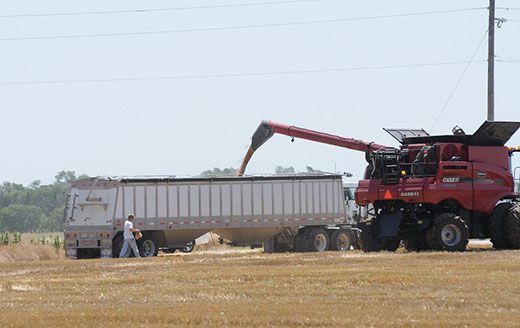House Ag Committee hears how agriculture may play role in mitigating climate change
Climate change and agriculture’s role in mitigating it is the talk of Capitol Hill now that President Joe Biden has taken office. But agricultural interests and farm organizations want Congress to know—any climate smart agricultural solutions that are proposed must be written to the benefit of farmers, and not investors.
On Feb. 25, the U.S. House of Representatives Committee on Agriculture held its first hearing on climate change and how American agriculture and forestry sectors can be part of the solutions that come out of Washington, D.C. House Ag Chairman David Scott, D-GA, and Ranking Member Glenn “GT” Thompson, R-PA, both agreed that American farm and forestry interests must be included in solutions if they’re to be successful.
“It is agriculture that is at the point of the spear when it comes to climate change,” Rep. Scott said in his opening remarks. And Thompson agreed to a point.
“I’d like to start my remarks by making a very clear position,” Rep. Thompson said. “The climate is changing. The Earth’s temperature is rising. And I trust the science that globally, industrial activities have contributed to the issue. Reducing global industrial emissions is what we should be pursuing.” And yet, Thompson added, any solutions should come from a science-based platform and any solutions must account for jobs in rural economies and the economic stability of the American farmer. He said he wants any solutions put forth to be locally led, voluntary, incentive-based and written for the benefit of the farmers and ranchers on the land.
The committee heard from a panel of experts that included Gabe Brown, North Dakota regenerative ag farmer and rancher, who has spoken previously at High Plains Journal’s Soil Health U. Jim Cantore of the Weather Channel and Zippy Duvall, president of the American Farm Bureau Federation, also testified, among others.
Cantore led off the witness testimony by stating, “There is a definite link between increasingly extreme weather events and a warming planet.” Cantore should know about extreme weather events through his work at the Weather Channel reporting from the midst of many of those disasters.
“Billion-dollar disasters are on the rise,” Cantore testified. “According to NOAA, there were a record 22 $1 billion weather disasters last year in the U.S., totaling $95 billion in total losses.” The derecho last August that hit Iowa farmland and wiped out crops, massive droughts and wildfires across the West, hurricanes that are stronger and slower than previously recorded, these are all overlapping and causing billions of dollars in damage to homes, businesses and farms, he testified. And that leads to ad hoc disaster bills in Congress that try to help farmers and ranchers recover. Whereas, as some on the panel testified, investing in climate smart agriculture initiatives may eventually lead to avoiding massive disasters all together.
Regenerative ag’s part to play
Brown has championed regenerative agriculture and soil health principles for decades. He testified that adopting these principles can both increase the profitability of farmers and help the environment at the same time. They just take time to adopt. And it’s an economic consideration for farmers who are working with lenders for lines of working credit and landowners who are looking for returns on their investments.
One answer Brown proposed time and again is that while agencies like the Natural Resources Conservation Service are doing great work in the soil health sphere, there needs to be more education of farmers and ranchers in the soil health principles and how they can use them in their particular operations.
Part of that may also lead to restructuring crop insurance, Brown testified.
“I didn’t say we need to end crop insurance but that we need to make it outcome based, and that outcome cannot solely be yields,” Brown testified. “In regenerative ag we increase the amount of nutrient-dense food grown per acre. There’s a misconception that regenerative ag practices mean less yield, but I produce 30 times as much nutrient dense food as I produced per acre before.”
Agriculture’s seat at the table
AFBF’s Duvall emphasized that farm and ranch production is key to our food security and our national security, something that America found out in the early days of the COVID-19 pandemic in 2020. As a way to ensure that its membership is treated fairly in climate legislation and initiatives, Farm Bureau brought together environmental and agricultural organizations under the Food and Agriculture Climate Alliance umbrella. Duvall testified that FACA is united under three principles: voluntary market participation and incentive-based policy; science-based outcomes; and that any measures promote resilience for the environment, but also help rural economies better adapt to climate change.
Farmers and ranchers are already doing their part to reduce greenhouse gas emissions and those who’ve already been doing the work must also be taken into consideration in any bills that are written, he added.
“American agriculture accounts for just 10% of total U.S. greenhouse gas emissions, far less than transportation, electricity generation and other industry sectors,” Duvall said. “The total carbon sink efforts from forestry, grassland and the management of our crop land offsets about 12% of total U.S. emissions. To continue to make these gains in carbon sequestration we need to increase investment in agricultural research” Investing in research into carbon sequestration methods, and data collection and verification efforts can help those working the land quantify their efforts for future carbon trading markets, he added.
The panel emphasized that any legislation and initiatives to come from Capitol Hill should be written with the producer in mind, and not the outside investor interests. You can watch the full hearing online at https://youtu.be/yPhuxaEum10.
Jennifer M. Latzke can be reached at 620-227-1807 or [email protected].
Sign up for HPJ Insights
Our weekly newsletter delivers the latest news straight to your inbox including breaking news, our exclusive columns and much more.


